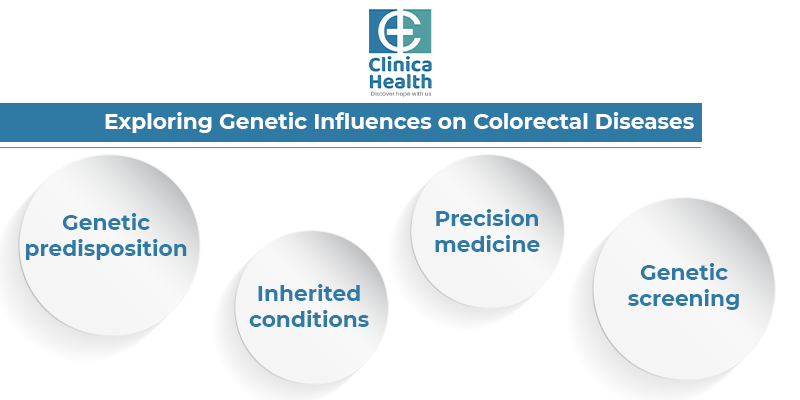-
 Call Now:
8010 552 552
7595 838 844
Call Now:
8010 552 552
7595 838 844
-
 Email Me:
[email protected]
Email Me:
[email protected]
The intricate interplay between genetics and disease is a subject of profound significance, especially when it comes to colon and rectal diseases. These conditions, ranging from benign polyps to malignant tumours, often have genetic underpinnings that shape their development and progression. In the quest to unravel this genetic nexus, the expertise of a colon and rectal surgeon emerges as hope and guidance.

Here are some of the important factors which allow the readers to understand the influences of genetics on the occurrence of colorectal disease:
Certain genetic variants, such as mutations in the APC, TP53, and KRAS genes, predispose individuals to colorectal cancer, the most severe manifestation of colon and rectal diseases. Hence, understanding these genetic predispositions is crucial for early detection and intervention
Lynch syndrome and familial adenomatous polyposis are inherited conditions that significantly increase the risk of developing colorectal cancer. Proficient colon and rectal surgeons like Dr. Purnendu Bhowmik play a vital role in managing these conditions through genetic counselling and tailored surgical interventions.
The advent of precision medicine has revolutionized the approach to treating colon and rectal diseases. By leveraging genetic insights, colon and rectal surgeons can tailor treatment strategies to individual patients, optimizing outcomes and minimizing risks.
Screening protocols based on genetic markers enable early detection of high-risk individuals, allowing for proactive interventions to prevent or mitigate the development of colon and rectal diseases. Colon and rectal surgeons are instrumental in implementing and interpreting these screening programs.
This blog highlights the impact of a specialist in operating this procedure with utmost care and experience.
An experienced surgeon plays a key role in diagnosing colon and rectal diseases through thorough clinical evaluations, imaging studies, and endoscopic procedures such as colonoscopy. The treatment planning begins with the right form of diagnosis apart from analysing their condition.
Based on the patient’s genetic profile, medical history, and disease stage, colorectal surgeons develop personalised treatment plans that may include surgical interventions, adjuvant therapies, and lifestyle modifications.
These experienced medical professionals are highly trained in performing a wide range of surgical procedures to treat colon and rectal diseases, including minimally invasive techniques such as laparoscopy and robotic-assisted surgery.
Following surgical treatment, designated surgeons provide comprehensive follow-up care, monitor patients for disease recurrence, manage treatment-related side effects, and promote long-term health and well-being.
Keeping the intricacies of colon and rectal diseases in mind, genetics serves as a guiding force, shaping our understanding and approach to these conditions. At the forefront of this endeavour stands the colon and rectal surgeon, whose expertise and dedication are instrumental in addressing the genetic complexities of these diseases.
While continuing to unravel the genetic mysteries of colon and rectal diseases, it is pivotal to acknowledge and appreciate the invaluable contributions of these surgeons. Through their specialised skills, compassionate care, and commitment to excellence, they offer hope and healing to patients affected by these challenging conditions, reaffirming their indispensable role in the fight against colon and rectal diseases.